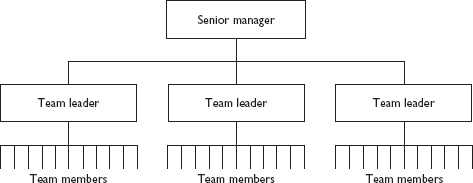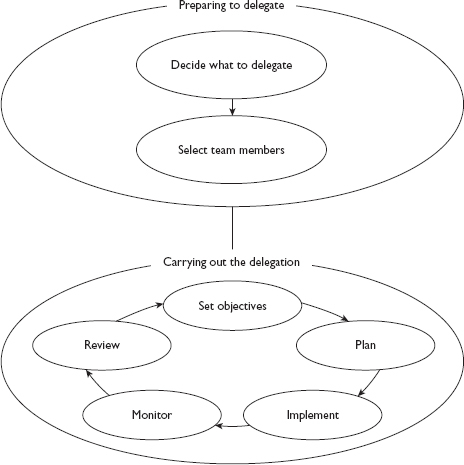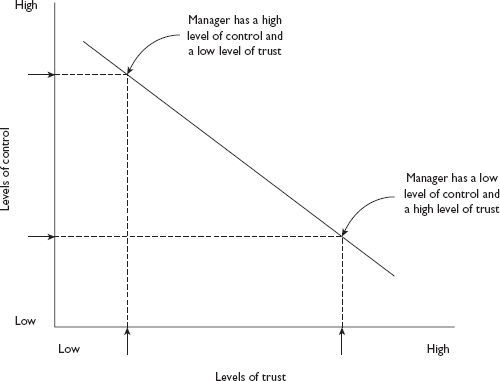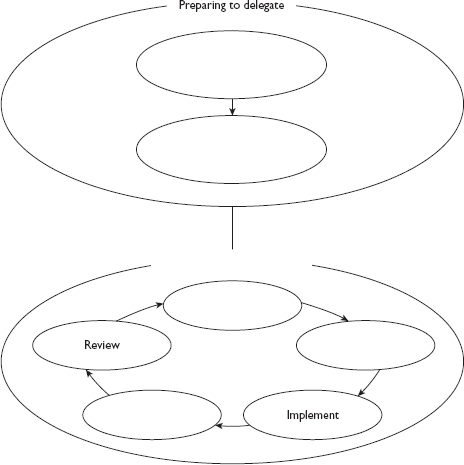Session B
Delegation – a vital skill
 1 Introduction
1 Introduction
Effective delegation enables you to get work done through other people and is central to effective management.
In recent years we have seen changes in the way work is organized. Organizations and workteams have become ‘lean’, but a lean workteam is no use unless it is flexible and able to respond quickly to new circumstances. So it is athletic workteams we need, not skeletons! Being flexible means being capable of being deployed where you are most needed. Delegating to your team means that you build up a pool of experience and skill which you can use in a flexible way. It also enables you to cope with pressure at work, when your organization asks you to achieve more in your work.
In this session we'll look at what is involved in delegating, and we will demonstrate that its practice is a skill, and as such can be both learned and improved.
Poorly managed delegation can lead people to think that delegation means someone is ‘passing the buck’, or just getting someone else to do their work for them. We'll see why effective delegation could not be further from this dismissive description. We'll show how it is an important technique to use for managing your team successfully.
 2 What does delegation mean?
2 What does delegation mean?
Giving a definition of delegation may seem a bit like trying to define ‘electricity’. Although it is fairly easy to see what it can do for you, it is difficult to describe what it is in words. Still, we need to start this session by knowing and agreeing what we are talking about. So what does delegation mean to you?
Activity 11 |
 |
Spend a little time thinking about delegation, perhaps your experience of delegation or delegation that you have observed at work. Then write down in a few lines what you think it means.
We have already said that some people regard delegation as passing the buck, but let's hope you have found a more positive description.
I would define delegation in the following way.
![]() Delegation means giving someone else the responsibility and authority to act on your behalf.
Delegation means giving someone else the responsibility and authority to act on your behalf.
You may have used different words in your description and still be correct. The important words are responsibility and authority and we will come back to these later.
So, if you delegate, you ask somebody else to do something or to make something happen, much as you normally do in your job.
You will know from your own experience that to make something happen at work you need resources of some kind. If you delegate a certain responsibility, then the member of your team who takes on that responsibility will need resources too, and you will have to think through how they are to be allocated.
Activity 12 |
 |
What are the resources which a manager has to allocate? List at least three in the space below.
Which of these do you think is the most important?
I hope we can agree that the resources which managers can allocate include equipment and materials, finance, information, time and people.
In most situations, people are the most important resource. People bring their skills and expertise to act on other resources in order to achieve results. Without their co-operation nothing will happen.
So delegation means negotiating agreement with other people in order to:
![]() give them responsibility to act on your behalf;
give them responsibility to act on your behalf;
![]() give them the authority needed to get the job done;
give them the authority needed to get the job done;
![]() allocate resources to them – including other people – that are needed to get the job done.
allocate resources to them – including other people – that are needed to get the job done.
 3 Why is it important to delegate?
3 Why is it important to delegate?
As a first line manager your organization has given you the authority to use resources to achieve results. For example, you use information from team members and from senior managers to make decisions and take action. You can share some of this authority with team members so they too can achieve results.
Delegating responsibility to team members can be one of the most helpful things you can do for them.
Effective delegation benefits team members in the following ways.
![]() Delegation helps people to develop new skills and competence and so demonstrate their ability.
Delegation helps people to develop new skills and competence and so demonstrate their ability.
![]() It helps people become more involved and trusted at work and to feel that they are valued members of the team.
It helps people become more involved and trusted at work and to feel that they are valued members of the team.
![]() It gives people a wider and more varied experience at work than they might otherwise get.
It gives people a wider and more varied experience at work than they might otherwise get.
![]() It enables people to find out more about what is going on.
It enables people to find out more about what is going on.
![]() It helps staff to feel empowered and increases their commitment.
It helps staff to feel empowered and increases their commitment.
| ‘True delegation, effective delegation, is delegation with trust and with only the necessary minimum of controls.’ Charles Handy Understanding Organizations (1999, p. 284). |
Successful delegation helps to develop team members who are competent, involved, committed and well-informed. Such team members are likely to perform highly – a real asset to any organization. By using delegation to help their team members, managers are also helping themselves – for you'll probably agree it is easier to work with a well-motivated competent team, than with a group of people who are reluctant to do the work and are not interested in what they are doing. But delegation is also an important management technique for at least four other reasons. It helps managers to: |
![]() make better decisions;
make better decisions;
![]() make the most of their own limited time;
make the most of their own limited time;
![]() keep control of a large team;
keep control of a large team;
![]() improve the team's overall performance.
improve the team's overall performance.
Let's look at these in turn.
3.1Making better decisions
As a team leader your role is to manage your team and the work it does. To do so effectively you need to make good decisions about all aspects of the work of the team.
Activity 13 |
 |
What do you think is needed if good decisions are to be made?
You may have mentioned the importance of reliable, up-to-date and complete information. I would argue that you need to have access to quality information in order to make a good decision.
As a team leader you are at the centre of a network of communications with information flowing from you and to you in all directions (see diagram). Your management perspective gives you an overview of what is going on – something which possibly none of your workteam quite shares. The better the flow of information, the better you can plan, organize and control the work for which you are responsible.

3.2Effective use of limited time
Most managers have more work to do than they have time for, and very often feel that some of their work never gets done or doesn't get the attention it deserves. Delegation allows managers to balance their workload.
![]() Managers can delegate the low to medium priority jobs to others and, by doing so, make sure that the jobs get done properly.
Managers can delegate the low to medium priority jobs to others and, by doing so, make sure that the jobs get done properly.
![]() With the time saved by giving some of their work to others, they will have more time to work on the high priority jobs and the work which only they can do.
With the time saved by giving some of their work to others, they will have more time to work on the high priority jobs and the work which only they can do.
Although the process of delegation takes time, bear in mind that it is time spent developing team members and giving them an opportunity to grow. This is an important management responsibility. So delegation represents effective use of a manager's time.
3.3Keeping control
‘Span of control’ is a term used to describe the number of members in a workteam for which a particular manager is responsible. That is, it states the number of people under their control.
We'll look at what this means in practice.
Activity 14 |
 |
Alex works for a large insurance company and is responsible for a sales team of forty. Recently the company brought in a new bonus scheme linked to the amount of new work each salesperson obtained. This resulted in the sales team increasing their individual business by an average of 25%. As a consequence, Alex's own workload increased considerably and the office work has begun to get into a bit of a mess.
Alex was called into the sales manager's office and asked to explain why things had got out of control lately. The manager suggested that Alex needed to take a course in office management so as to be better able to cope with the work. Alex's response to this was to say that what was needed was not more training but fewer people to supervise.
Which of these two suggestions do you think is more likely to solve Alex's problem?
I expect you agree that Alex's problem is not likely to be a lack of training, but too large a span of control. It is always going to be difficult to control a team of forty without having assistance.
There is no definite ‘best’ number of people that a first line manager can control, but some management experts have suggested that it can be as high as twelve, provided these people do not themselves supervise others. Much depends on the circumstances, such as the nature of the job, the time available for direct supervision, the character of the workteam and the amount of training received.
What is clear is that the greater the number of people in a workteam, the more difficult it is for their manager to keep control.
Delegation is a major way of coping with a large a span of control, and it is the reason why organizations use ‘family-tree’-type structures, that look like this.

The workforce is divided into teams, usually with a team leader or first line manager responsible for a relatively small number of people.
Delegating work is one important way to help you keep effective control of a large group of people. By using delegation, you can give each member of your workteam responsibility for making sure their own part of the group's work fits into place. This encourages greater commitment and participation, essential elements of successful teamwork.
In this way a workteam is rather like an orchestra – each section, such as the strings, percussion, and so on, is responsible for its own part of the musical score – with you playing the role of conductor and being responsible for bringing all the parts together for a perfect performance.
3.4Improving the team's performance
| ‘Management, above everything else, is about people. It is about the accomplishment of ends and aims by the efforts of groups of people working together.’ Sir John Harvey-Jones. |
To improve the way your team works you need to bring together the individual contributions of the people in your workteam so that they form a united group, working towards the same ends. This involves:
|
Activity 15

How do you think delegating work can actually improve team performance?
Delegation gives you the opportunity to make the most of the individuals in your team and to show that you value them and their work. You can improve the team's performance by delegating in two different ways.
| EXTENSION 1 As a team leader you need to motivate your team members. To find out more about motivation, see Extension 1 on page 101. |
|
Activity 16

Think about what you have learned about the importance of delegating, and give at least one reason why delegating is important to the following people.
![]() Team leaders.
Team leaders.
![]() Team members.
Team members.
![]() Organizations.
Organizations.
With effective delegation, everybody wins.
Delegation enables team leaders to:
![]() develop a committed and motivated team;
develop a committed and motivated team;
![]() develop the skills of individuals;
develop the skills of individuals;
![]() draw on the expertise of their team members;
draw on the expertise of their team members;
![]() make better decisions;
make better decisions;
![]() make effective use of their own time;
make effective use of their own time;
![]() co-ordinate and control a team;
co-ordinate and control a team;
![]() improve the performance of the team.
improve the performance of the team.
Effective delegation can help individual team members to:
![]() increase their skills and expertise;
increase their skills and expertise;
![]() get a variety of experience, increasing their opportunities to participate;
get a variety of experience, increasing their opportunities to participate;
![]() feel that they are trusted and valued members of the team, which encourages greater commitment;
feel that they are trusted and valued members of the team, which encourages greater commitment;
![]() increase their knowledge about the organization and the work of the team as a whole.
increase their knowledge about the organization and the work of the team as a whole.
Delegation can promote a competent, committed, enthusiastic and well-informed workforce, and this is obviously important to any organization. But delegation is also important to organizations because it increases the flow of information at all levels, and effective communications throughout an organization are essential for good decision making.
 4 Objections to delegating
4 Objections to delegating
We have seen some of the main reasons why delegation is an important technique, bringing benefits to team members, team leaders and the organization as a whole.
But some team leaders seem to be rather reluctant to pass on work to members of their workteam.
Activity 17

Jot down one or two reasons for reluctance to delegate work.
You could have thought of a number of possibilities. The first ones that strike me are the following.
![]() People may think that it's quicker to do the job themselves, or find that they are not satisfied with the quality of job that one of their workteam would do, and so prefer to do the job themselves.
People may think that it's quicker to do the job themselves, or find that they are not satisfied with the quality of job that one of their workteam would do, and so prefer to do the job themselves.
![]() As we have already mentioned, delegation demands that you make resources available, and in an attempt to protect their position of authority, some people like to keep resources – especially information – to themselves.
As we have already mentioned, delegation demands that you make resources available, and in an attempt to protect their position of authority, some people like to keep resources – especially information – to themselves.
![]() People may feel that asking somebody else to do something implies that they are not able to do it themselves and are not really up to the job.
People may feel that asking somebody else to do something implies that they are not able to do it themselves and are not really up to the job.
![]() They may not trust the workteam and may feel that delegation of work means it is going outside their control.
They may not trust the workteam and may feel that delegation of work means it is going outside their control.
Although we may recognize these concerns, we will see in this workbook that they do not represent sound reasons for reluctance to delegate. They suggest, instead, a misunderstanding about what delegation actually involves. We'll look at this in some detail, but first let's return to the ideas of authority and responsibility that are at the core of delegating.
 5 Authority and responsibility
5 Authority and responsibility
We have already suggested that delegation happens when, as a team leader, you negotiate with a member of your workteam to give them the authority to do something on your behalf. At the same time, you have made them responsible for doing the job.
However, this doesn't mean that you can pass responsibility to them for seeing that the job gets done properly, and on time.
If you give a team member the authority to do something, you may be losing some authority, since you no longer make the decisions – they are made by the team member instead. But when you give authority to the team member, you do not lose any responsibility – if anything you increase it. Although the team member is responsible for doing the job, you are responsible both for getting it done and for trusting the team member to do it. So delegation means you lose some authority, but both you and the team member gain responsibility.
In the end the overall responsibility is yours – after all, that's what managers and team leaders are paid for. Otherwise you have given up your job altogether, rather than just delegating a part of it.
5.1Responsibility and accountability
Who are you accountable to in your organization? And who is accountable to you? |
These terms are often used interchangeably, but in fact they mean different things. It helps to think of them as ‘responsibility for’ and ‘accountability to’ in order to perceive the distinction. As we've seen, there are things about your job that you are always responsible for, including the outcome of the delegated tasks. However, your job in the organization's hierarchy inevitably means that you are accountable to or answerable to someone else higher up the line of authority. This is why you can never relinquish ultimate responsibility, because it is you who will have to answer for the consequences of any actions that you take. |
Peter was managing a large publishing project for a client. The workload turned out to be much heavier than he had anticipated, and in order to meet the deadline, he sub-contracted part of the work to another free-lance colleague, Gerry. Despite Peter's careful instructions, Gerry made what Peter described as ‘a complete pig's ear’ of the job. ‘It just wasn't possible to send the work back to the client,’ he said to a friend. ‘They would have just flung it back in my face. And you can't say, “Well, it's not my fault, someone else made a mess of it.” It was up to me to make sure it was sent off to the client in an acceptable state. So I worked day and night for several days to make sure it was. It was me who would have to explain to the client why the work was in a mess, not Gerry, because I was ultimately responsible for the job, not him.’
5.2Authority and power
Authority also gives power. Your authority as a manager gives you power to influence other people. One definition of power is ‘the means of influencing the thoughts and actions of others.’ The higher up the organization people are, the more power and influence they have. This is position power, and we'll look at it briefly here. Your job as a manager gives you position power.
There are different degrees of position power, depending on how high up you are in the organization. The managing director will have a great deal more position power than a first line manager. He or she will be able to influence many more people's thoughts and actions and to a much greater extent.
There are various strategies you can employ as a supervisor to influence your staff. Some will be particularly effective when your position power is high. Others will depend more on using personal power. These strategies include:
![]() assertiveness – used most frequently when position power is high but success will be difficult to achieve;
assertiveness – used most frequently when position power is high but success will be difficult to achieve;
![]() friendliness – often used when both position power and expectations of success are low;
friendliness – often used when both position power and expectations of success are low;
![]() reason – used frequently when position power and expectations of success are high;
reason – used frequently when position power and expectations of success are high;
![]() referral to a higher authority;
referral to a higher authority;
![]() sanctions or disciplinary action.
sanctions or disciplinary action.
You'll often use more than one strategy, but you should aim to avoid using the last two unless absolutely necessary.
Deena had been recently promoted to a managerial position. At first she felt uncomfortable in the role because she was no longer at the same level as her colleagues, with whom she'd been very friendly, and she felt they no longer regarded her in the same way as before. She tried adopting the strategy of asking them to do things in a friendly way. Although this worked part of the time, if it was a case of asking someone to do an unpopular task, it was more difficult to get anyone to agree. They'd make a joke of it and make excuses as to why they couldn't do it, and she spent a lot of time trying to persuade people to no avail. Eventually Deena went on an assertiveness training course, and now has a much better idea of how to use her personal power in an assertive way to get things done.
Activity 18 |
 |
Jot down what you see as the difference in the responsibility for a job between a team leader and a member of their workteam to whom they have delegated it.
However, instead of thinking of mechanical or electrical power, think instead of kindness. If I am kind to you and that encourages you to be kind to others, I don't become less kind. I don't have a stock of kindness that reduces as I use it. In fact, by being kind to others I increase the stock of kindness in the world. Personal power is like this; the more we allow others to make decisions, the more power we create. This is called non-zero sum, because adding power doesn't take it away. You still possess the power you delegated, but so does the person you delegated it to.
You have also increased accountability, because the person with the delegated power becomes accountable to you for the way they use it, and you stay accountable for the power you still possess. Accountability is non-zero sum as well. The more power is delegated down, the more power there is, and the more accountability there is as well. If you delegate effectively, you will stay in overall control. Let's see what's involved in effective delegation.
 6 The process of delegation
6 The process of delegation
To delegate effectively you need to take time to prepare to delegate and then go on to carry out the delegation.

In preparing to delegate you look at the overall picture of your work, and the workload, competence and needs of team members. You will decide:
![]() what tasks, activities and duties you can delegate;
what tasks, activities and duties you can delegate;
![]() to which of your team members you delegate these to.
to which of your team members you delegate these to.
We look at preparing to delegate in Session C.
To carry out the delegation you need to do the following.
![]() Set and agree the objectives. In other words, what do you want the person to whom you are delegating to achieve?
Set and agree the objectives. In other words, what do you want the person to whom you are delegating to achieve?
![]() Plan the delegation by:
Plan the delegation by:
![]() allocating appropriate resources – in other words, what resources are needed to achieve the objectives, including support from you;
allocating appropriate resources – in other words, what resources are needed to achieve the objectives, including support from you;
![]() deciding how to keep track of progress – for example, at what stages will the person taking on the task report to you;
deciding how to keep track of progress – for example, at what stages will the person taking on the task report to you;
![]() briefing the team member and agreeing the way forward, and agreeing milestones, in other words what will be achieved when.
briefing the team member and agreeing the way forward, and agreeing milestones, in other words what will be achieved when.
![]() Let the team member implement the delegated task – when the team member begins to do the work, you take a back seat while still providing support and controlling the work in the ways you have agreed.
Let the team member implement the delegated task – when the team member begins to do the work, you take a back seat while still providing support and controlling the work in the ways you have agreed.
![]() Monitor the delegated task – both you and the person carrying out the delegation will need to keep an eye on progress, to ensure the task is going according to plan and going to meet the objectives, and then taking action, where appropriate to ensure the task stays on course.
Monitor the delegated task – both you and the person carrying out the delegation will need to keep an eye on progress, to ensure the task is going according to plan and going to meet the objectives, and then taking action, where appropriate to ensure the task stays on course.
![]() Review the delegated task with the team member when it is completed by:
Review the delegated task with the team member when it is completed by:
![]() evaluating what went well and what aspects could be improved next time;
evaluating what went well and what aspects could be improved next time;
![]() giving helpful feedback to the team member to improve future performance.
giving helpful feedback to the team member to improve future performance.
Notice that these stages – setting objectives, planning, implementing, monitoring and reviewing – tend to form a continuous cycle. This is because when you have completed the review stage you are then ready to set new or revised objectives. As a team leader you may be familiar with this cycle which is used for planning and controlling many work activities.
We will look in more detail at the stages of carrying out the delegation in Session D.
Activity 19

You have looked briefly at what's involved in delegating effectively. Write a checklist of the things team leaders must do to meet their responsibilities when delegating tasks to their team. We have given the first one to start you off.
When delegating team leaders need to:
![]() decide which of their tasks they can delegate;
decide which of their tasks they can delegate;
Your checklist should show that team leaders need to prepare for delegating by deciding what to delegate and who to delegate to. They then need to set objectives and plan the delegation. They need to support the team member who is carrying out the delegated task and monitor the task in the ways that have been agreed. Finally, they need to review the delegation with the team member, providing appropriate feedback and considering how to make improvements next time. By using the process of delegation, team leaders meet their responsibilities for getting the job done properly.
 7 Levels of control in delegation
7 Levels of control in delegation
In delegating effectively you will stay in overall control. However, as a manager you can choose an appropriate level of control to match:
![]() your preferred approach;
your preferred approach;
![]() the skills, experience and attitudes of your team members;
the skills, experience and attitudes of your team members;
![]() the constraints of the job.
the constraints of the job.
In general, the level of control managers use in delegation will relate to the extent to which they trust their team members to do a good job. You can see the relationship between trust and control in this graph.

Managers who have a high degree of trust in team members are likely to feel they need to take little direct control of the work themselves.
For example, when a manager gives a team member a high level of responsibility for the delegated task, the team member is able to make his or her own decisions as to method, timing, resources and so on, although he or she will usually discuss these decisions with the manager, and the manager may offer guidance, advice and support.
Here is how one manager explains how she controls her team.
‘I find the best way to keep things under control is to make sure my team know what we need to achieve and the importance of working to company regulations and procedures. I make sure they know they can come to me to discuss ideas and explore possibilities. Then I leave them to carry on with the job, only checking that it is going OK in an informal way.’
When managers have a low level of confidence or trust in team members they are likely to take a high level of direct control of the work, and limit the responsibility they give to each person. For example, they may tell the team member how to do the job, and ask for regular and routine progress reports at various stages.
Whatever level of control is used, it is important to bear in mind that, since nobody is perfect, some mistakes are bound to be made by your team. However, this should not stop you delegating to them.
Activity 20

How do you feel when someone shows that they trust you to do something on their behalf?
How do you feel when someone asks you to do something, but then doesn't let you get on with it, and clearly doesn't trust you to get it right?
I think most people feel committed to doing a good job when they are entrusted with it. They are likely to put in the effort required to get it right. But when they know they aren't expected to do a good job, most people would lack motivation, commitment and interest in the work.
Showing you trust your team is important if they are to give their best to a job. However, trust is a quality which grows and develops through experience and over time.
If you do not yet have confidence in team members’ abilities, you can use careful delegation to build trust. Bear in mind that the process of delegation helps you to develop the skills of your team members.
Use high levels of control when you delegate tasks at first. By doing this, you can give appropriate advice and support whenever you feel the team member needs help. In this way you make it more likely that the team member will succeed. When the team member succeeds in carrying out tasks, you will have more confidence to gradually release direct control, giving that individual more responsibility to do a good job, and showing more trust in them.
Remember that you – as manager – retain overall responsibility for a job you have delegated. In the next two sessions we look at how to do this by going through the process of delegation.
 8 How effective delegation will help you
8 How effective delegation will help you
We have seen that with delegation everybody wins, and we have looked at the stages involved in delegating effectively. Before we look at the particular advantages you are likely to gain from effective delegation, work through the next activity.
Activity 21

Answer Yes or No to each of the following questions.
1 Do you spend time doing things which you think other people in your work team could do for you? |
|
2 Do you find that a number of tasks on your list of jobs cannot be placed under the headings of planning, organizing, motivating, developing or controlling, creating and communicating? |
|
3 Do you work on jobs which you like to do, although others in your workteam could do them just as well, if not better? |
|
4 Do you find yourself frequently interrupted by telephone calls which could just as easily be dealt with by someone else? |
|
5 If you are temporarily away from your workteam, do they have to delay decisions until you come back? |
|
6 Do you find that others seldom reach the high standards you set for them? |
|
7 At the end of the day, do you have a number of unfinished tasks which you feel should have been done? |
|
8 Is it difficult for you to find time to consult with your workteam regularly? |
|
9 Do you keep information about work tasks to yourself on the grounds that, as supervisor, you ought to know things the rest of your team don't need to know? |
|
10 Do you feel that in general you are overworked? |
|
11 Do you have problems with access to the information or contacts you need to make decisions? |
|
12 Are you slowed down by the lack of authority to make decisions? |
In this session we have looked at the meaning of delegation, and at the reasons why it is important to delegate to your team. We have introduced the process of effective delegation, which involves preparing for the delegation – deciding what and to whom to delegate and then carrying it out through the activities of setting objectives, planning, implementing, monitoring and reviewing. You have looked at your own situation, and at how delegating could benefit you. By now you should have an idea of the advantages you want to gain through effective delegation.
Self-assessment 2 |
 |
For questions 1 to 6 complete the sentences with a suitable word or words.
1 Delegation means giving someone ___________ and __________ to act on your behalf.
2 If a task is delegated to you, you also need __________ allocated to you in order to carry it out.
3 When you delegate a task, you have __________ __________ for seeing that a job is done properly and on time.
4 Successful delegation helps to develop team members who are _________, _________, ___________ and __________.
5 Delegation enables team leaders to draw on the expertise of team members and so improve __________ __________.
6 Give two reasons why delegating represents an effective use of your time.
7 What does ‘span of control’ mean?
8 Complete the following diagram to show the process of delegation.

9 Complete the following sentence with the appropriate words.
The level of __________ you decide to take when you delegate is related to how much you __________ the person to do a good job.
10 How can you develop trust through delegating?
Answers to these questions can be found on page 104.
9 Summary
![]() Delegation means giving someone else the responsibility to act for you and the authority to do it.
Delegation means giving someone else the responsibility to act for you and the authority to do it.
![]() Authority confers power, which may in practice flow from the position (position power) or from the person who holds it (personal power).
Authority confers power, which may in practice flow from the position (position power) or from the person who holds it (personal power).
![]() Delegation helps to make team members well-informed participants, who are competent, involved and committed.
Delegation helps to make team members well-informed participants, who are competent, involved and committed.
![]() Delegation is an important management technique to use to:
Delegation is an important management technique to use to:
![]() make better decisions;
make better decisions;
![]() make effective use of time;
make effective use of time;
![]() keep control of a large team;
keep control of a large team;
![]() improve the performance of the team.
improve the performance of the team.
![]() The ultimate responsibility for seeing that a job is done properly and on time is the team leader's.
The ultimate responsibility for seeing that a job is done properly and on time is the team leader's.
![]() Managers are responsible for the tasks and the people over whom they have authority; they are accountable to the person in authority over them.
Managers are responsible for the tasks and the people over whom they have authority; they are accountable to the person in authority over them.
![]() To keep control of a delegated task you need to delegate effectively as follows.
To keep control of a delegated task you need to delegate effectively as follows.
![]() Prepare for delegation by choosing an appropriate task and selecting an appropriate person.
Prepare for delegation by choosing an appropriate task and selecting an appropriate person.
![]() Carry out the delegation by:
Carry out the delegation by:
setting clear objectives;
planning;
implementing;
monitoring;
reviewing.
![]() Review the delegation.
Review the delegation.
![]() The level of direct control you take in delegating is related to the amount of trust you have that the person who will carry out the delegated task will do a good job.
The level of direct control you take in delegating is related to the amount of trust you have that the person who will carry out the delegated task will do a good job.
![]() You can develop trust in team members by going carefully through the process of delegation and helping the team member to be successful by using an appropriate level of control.
You can develop trust in team members by going carefully through the process of delegation and helping the team member to be successful by using an appropriate level of control.
